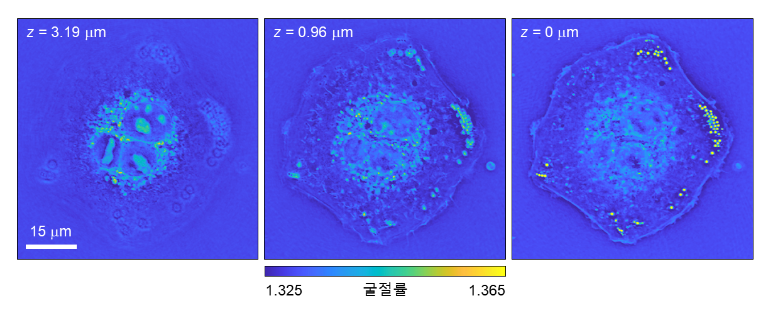Prof. YongKeun Park’s group at KAIST has developed a novel holographic microscopy for the label-free imaging of biological specimens. Unlike existing methods, this new approach measures optical phase delays induced by biological specimens without interferometry. This result will open up the new possibility of holographic imaging for optical, electron and X-ray microscopy. The study was published online in Nature Photonics (Intensity-based holographic imaging via space-domain Kramers-Kronig relations, Nature Photonics (2021))
Holography is a technique that records a wave. It has advanced imaging science by visualizing wave-matter interactions. The key to holographic imaging is to convert optical phase information to the intensity, and vice versa. Such a conversion has been realized mostly by interferometry. However, the interferometric approach is challenging as it requires a complex setup, a coherent source and good long-term stability. While non-interferometric methods based on computational algorithms have been proposed as alternatives, they have limited applicability due to their a priori information and assumptions.
Dr. YoonSeok Baek and Prof. YongKeun Park have developed a new approach for holographic imaging inspired by the Kramers-Kronig (KK) relations. KK relations are often used to describe the relationship between the refractive index and the absorption of a material, but the authors found that KK relations can be used ascertain the optical phase from the intensity under certain conditions. The researchers successfully acquired holographic images of microscopic objects using an optical microscope simply by controlling the incident angle. Furthermore, they conducted 3D refractive index tomography of biological cells by combining the retrieved holographic images at different incident angles. The resultant 3D image of lung cancer (A549) cells reveals sub-cellular structures with a high spatial and temporal resolution. This work was supported in part by the National Research Foundation of Korea.

Dr. YoonSeok Baek Dept. of Physics, KAIST
Homepage: http://bmol.kaist.ac.kr
E-mail: yk.park@kaist.ac.kr






